The ultimate Local SEO Guide for Plastic Surgeons:
How to dominate your local market and get most patients from your local area? The answer is simple: “By Dominating the Google Maps in Google Search”. Local SEO helps you do just that. This is the only Local SEO guide you’ll ever need to dominate your local market.
Published on November 30, 2024

1. Local SEO vs. PPC vs. SEO: What’s the Difference?
2. Why Local Search is Key for Plastic Surgeons
Step 1: Claim or Create Your Google Business Profile
Step 2: Local SEO Optimization for Plastic surgeons
Step 3: Reviews and Reputation Management
Step 4: Traditional SEO Signals
The only thing worse than getting no surgery leads is getting loads of calls from people who aren’t serious about booking consultation to get surgery. No busy plastic surgeon (aka you) has time for these low-quality leads.
Yet its reality for many plastic surgery centers who rely on billboards, radio ads, social media posts,
Or poorly managed google ads (PPC) campaigns that bring in the wrong traffic.
When you can’t control who sees or hears your ads, you end up wasting time on unqualified callers. This is where highly-targeted local SEO for plastic surgeons can help you win the qualified leads.
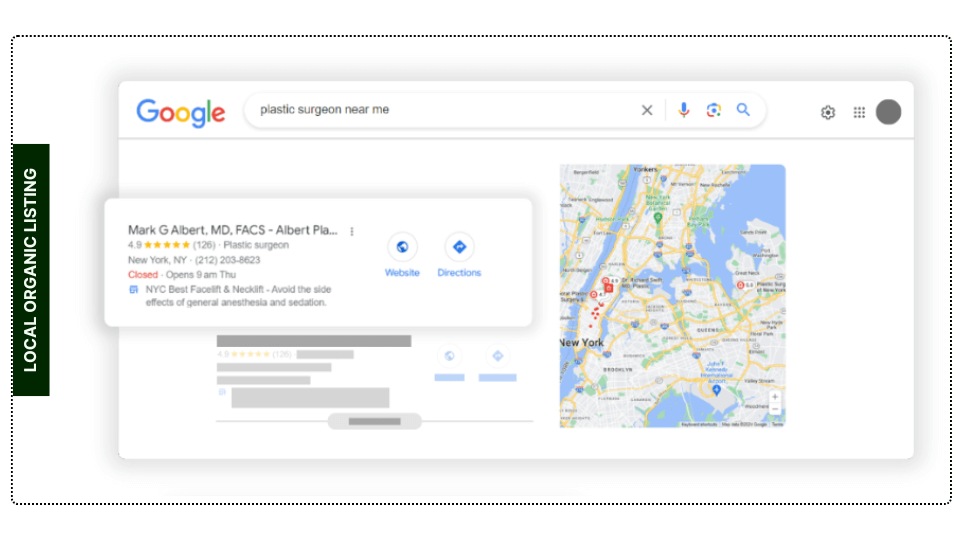
Local SEO is super important for plastic surgeons who want to get more patients from their area. It’s all about making your Google Business Profile (GBP) and website better so you show up in local searches. This means when people look for plastic surgery services nearby, your plastic surgery center appears in the search results.
Local SEO matters because most people use search engines to find local businesses, including local plastic surgery centers. Almost half (46%) of all Google searches are for local information.
By optimizing your Google Business Profile (GBP) and website for local SEO, you can attract more patients to your center.
Local SEO vs. PPC vs. SEO: What’s the Difference?
Local SEO, PPC, and traditional SEO all aim to get your website in front of searchers, but they work in different ways and appear in different places.
Let’s break this down
What is Local SEO?
Local SEO involves various tactics to show up in local search results on Google and other search engines. For example, when someone searches “rhinoplasty NYC,” local businesses show up as:
- PPC ads
- Local business listings
- Organic search results
- People also ask results
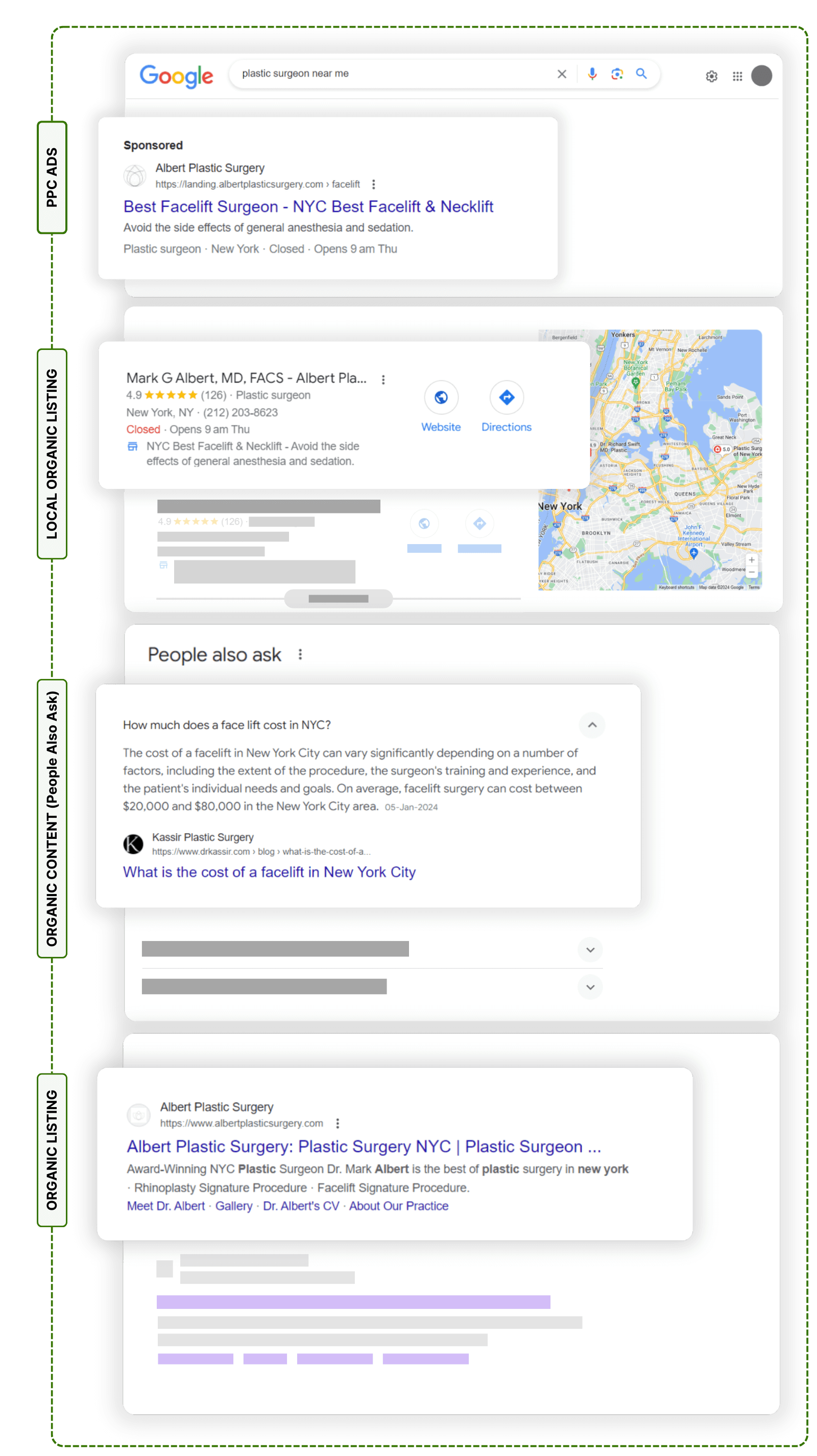
Local SEO results appear in the business listings section, known as the local 3-pack.
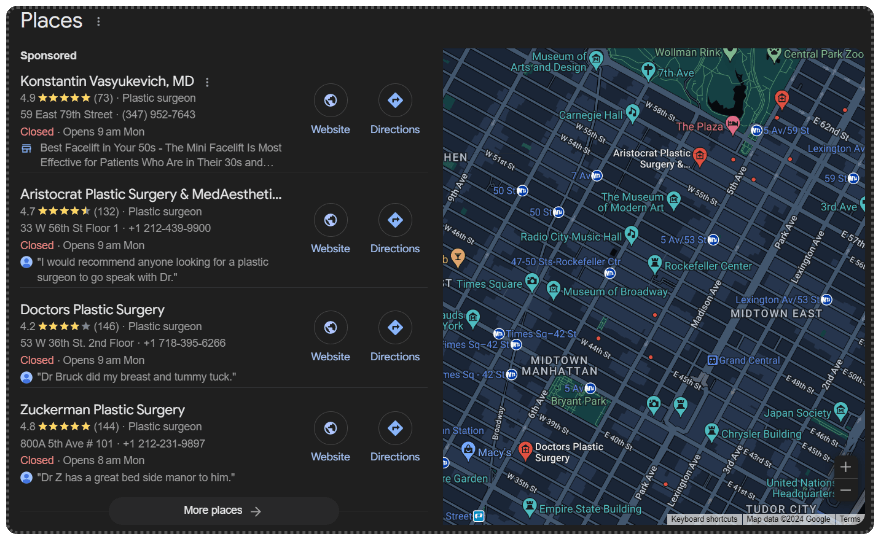
If done right, your plastic surgery center can be one of the top three results.
To achieve this, you need to focus on what Google’s algorithm looks for:
Relevance: How well your center’s name, address, and phone number (NAP) and website content match what searchers are looking for (search intent).
Proximity: How close your plastic surgery center is to the searcher’s location.
Prominence: How well-known and established your plastic surgery center is, which is influenced by backlinks and online presence.
By nailing these factors, you can rank high on Google and get more qualified surgery leads.
Here’s how you do it:
- Claim and optimize your Google Business Profile listing (and business listings on other search engines).
- Use local search terms on your website service pages.
- Improve your reviews and ratings.
Following these steps helps you attract more leads ready to book consultations and surgeries.
What is PPC?
Google search ads or PPC , is a Pay-Per-Click method where you pay each time someone clicks on your ad. PPC for plastic surgeons can be a powerful tool to attract more qualified leads.
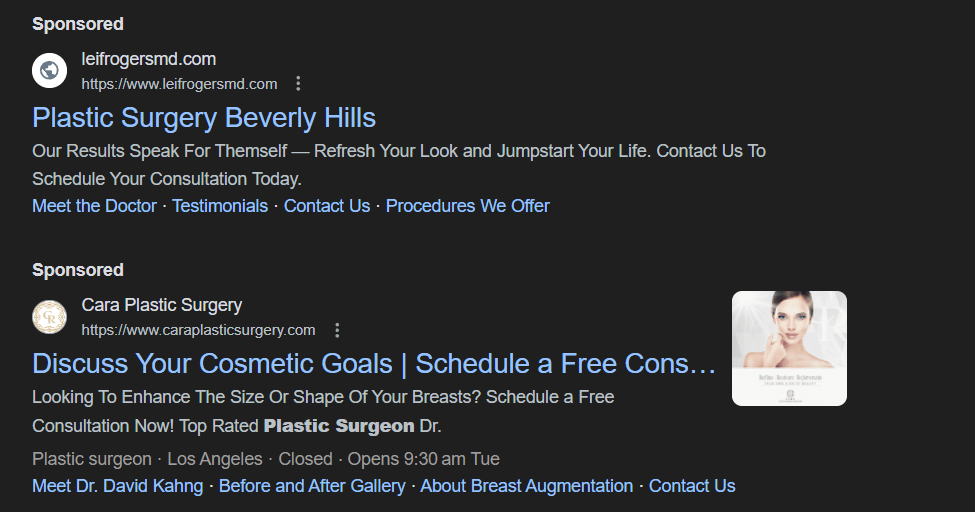
By bidding on keywords related to your services and location, your ads will show up on search engine results pages (SERPs). The cost per click (CPC) depends on how competitive the keyword is; highly competitive keywords can cost a lot, sometimes even hundreds of dollars per click.
The advantage of PPC is that it targets individuals actively searching for plastic surgeons. However, creating a successful PPC campaign requires careful planning.
If you choose the wrong keywords, you might end up paying for clicks that don’t convert into surgery clients. Additionally, your landing pages must be optimized with the right keywords to avoid wasting money on irrelevant leads.
Your ads must be relevant and engaging to capture the attention of searchers, or you risk losing potential surgery clients to competing plastic surgery centers.
What is SEO?
SEO, or Search Engine Optimization, involves optimizing your website to rank higher in organic search results, which appear below paid ads and local business listings.
Unlike PPC, you don’t pay for these organic listings, but it takes longer to see results, and maintaining high rankings requires continuous effort.
To rank well, you need to focus on both on-page and off-page SEO tactics. This includes:
- Publishing high-quality, relevant content that meets the needs of your audience.
- Building backlinks by creating authoritative content that other sites want to link to or by guest posting on high-authority sites.
- Adding metadata, such as title tags and descriptions, to each page on your site.
- Optimizing your site for speed and user experience.
- Ensuring your Name, Address, and Phone number (NAP) details are consistent across your site to build credibility.
The main difference between traditional SEO and local SEO is their focus. Traditional SEO aims to improve your website’s ranking globally, while local SEO focuses on ranking for location-specific keywords to improve visibility in a specific area or on Google Maps.
Traditional SEO tactics include link building, keyword research, and on-page optimization. Local SEO tactics include like building local citations, optimizing your Google Business Profile, and getting positive online reviews.
Combining local SEO, PPC, and traditional SEO strategies is essential for a comprehensive digital marketing approach. These methods should work together to enhance lead generation for plastic surgeons, rather than being used in isolation.
Why Local Search is Key for Plastic Surgeons
The answer is simple: Google is how people find you in today’s digital world.
When someone needs a plastic surgeon, they go to google for information. Once they’re ready to choose, they use local search to find a nearby plastic surgeon. These are the leads you want to call your surgery center.
Here are some key benefits of local SEO:
- Increase Leads: Showing up in local search results puts your surgery center in front of people looking for your services right now. Local SEO targets these specific searchers, bringing you more qualified leads.
- Save Money: Old-school ads like billboards and radio spots can cost a lot. Local SEO helps you reach potential clients without the high price tag.
- Outshine Competitors: Being in the local search results means more clicks from potential surgery clients. Many people start and end their search here before looking any further.
To get these benefits, you need a strong local SEO strategy. We’ll dive into the 4 key Steps of the ultimate Local SEO Strategy.
1. Claim or Create Your Google Business Profile
Start by claiming your Google Business Profile (GBP) listing. Go to Google Maps, search for your practice, and click “Claim this business.” If your practice isn’t listed, click “Add your business.”
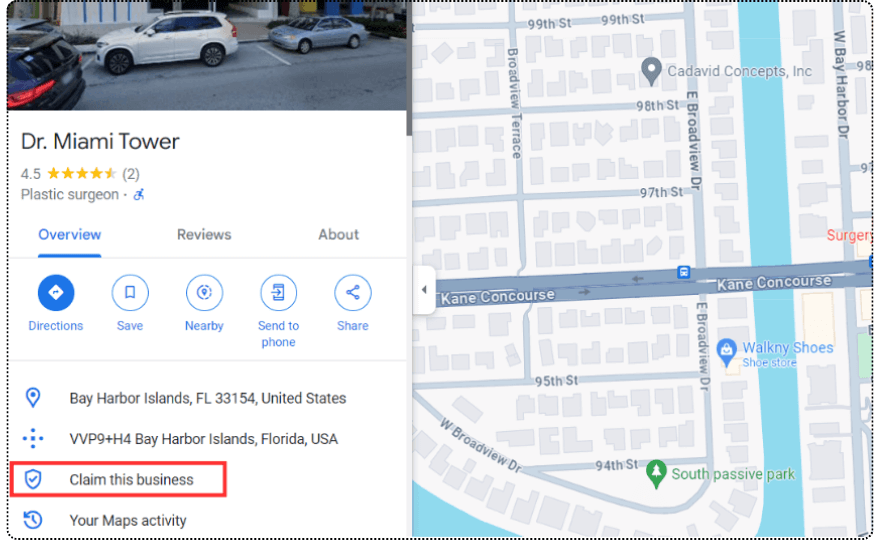
Don’t see your business appear? Click “I own or manage another business.”
If you know your law firm isn’t listed, go to Google Maps and click “Add your business” in the menu on the left side.
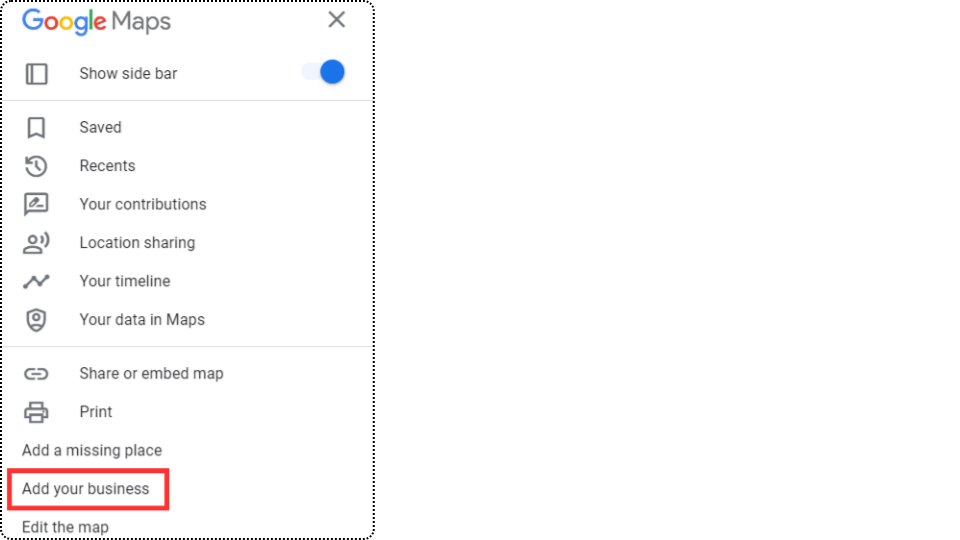
As you’re claiming or creating your business listing, keep the following in mind:
- Pick a primary category that best describes your business (e.g., plastic surgeon).
- Upload images of your plastic surgery center and happy patients (both inside and out) in PNG or JPG formats, ideally 720 x 720 pixels.
- Complete your listing with your address, phone number, hours, services, and a detailed description.
2. Local SEO Optimization for Plastic surgeons
Optimizing your plastic surgery center’s online presence is crucial to attracting local clients.
Whether you’re just starting or looking to fine-tune your strategy, focusing on keyword research, on-page optimization, and off-page optimization will get you on the right track.
Each of these elements plays a vital role in boosting your search engine visibility and driving more qualified leads to your center.
Keyword Research for Plastic Surgery Local SEO
Keyword research is the backbone of any successful local SEO strategy. By identifying the most relevant and high-conversion keywords, you can tailor your content to match what potential patients are searching for.
When you target the right keywords, you increase your chances of appearing higher in search results, which leads to more qualified leads coming to your surgery center.
This means targeting specific procedures like “rhinoplasty in New York” or “top plastic surgeon in Miami” to ensure your practice shows up in the right searches.
Brainstorm Potential Keywords: Start by brainstorming a list of potential keywords. Think about the services you offer and the locations you serve. For instance, if you specialize in rhinoplasty in Los Angeles, you might consider keywords like “rhinoplasty Los Angeles,” “nose job in LA,” or “best rhinoplasty surgeon in Southern California.”
Use Keyword Research Tools: Next, use keyword research tools like Google Keyword Planner to refine your list. These tools help you discover the search volume and competition level for each keyword, giving you insights into which keywords are most valuable. You might also uncover related keywords that hadn’t crossed your mind.
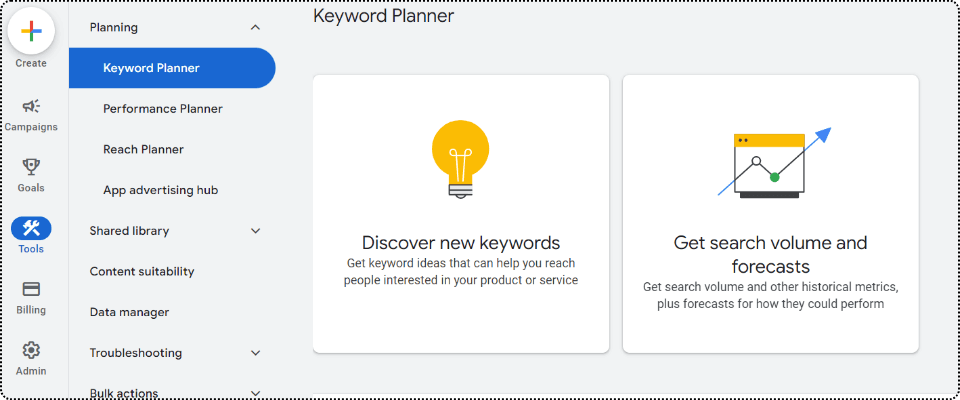
Analyze Your Competition: Take a look at what your competitors are doing using SEMrush or Ahrefs. Which keywords are they targeting? How are they ranking? By analyzing the competition, you can identify gaps in their strategy that you can capitalize on.
Choose and Use Your Target Keywords: Once you’ve done your research, select the most relevant and high-conversion keywords to target. Incorporate these keywords into your website’s content, blog posts, and other online materials. Remember to use them naturally—stuffing your content with keywords can actually hurt your rankings.
On-Page Optimization for Local SEO
On-page optimization is all about making sure your website is set up to tell search engines exactly what you do and where you are. This process is crucial for improving your site’s visibility in local search results and driving more local traffic to your plastic surgery center.
To optimize website content and meta data for local search, follow these tips:
Incorporate Location-Based Keywords: Ensure you’re using location-based keywords in all the right places: your headlines, headings, body text, title tags, and meta descriptions. These keywords help Google understand where your center is located and what services you offer.
Include Local Contact Information: Your practice’s name, address, and phone number (NAP) should be prominently displayed on every page of your website. This information needs to be consistent with what’s on your Google Business Profile and other online directories. This consistency is key to improving your local search rankings.
Create Location-Specific Landing Pages: If you serve multiple locations, consider creating dedicated landing pages for each area. These pages should be optimized with location-specific keywords and include detailed information about the services you provide in each area. This helps you target local searches more effectively.
Optimize Images and Videos: Don’t forget about your multimedia content. Make sure your images and videos are optimized with location-based file names and alt tags. This not only improves accessibility but also boosts your SEO.
Use Structured Local Schema Markup: Consider using structured data markup to give search engines more detailed information about your surgery center. This could include your business hours, services, and customer reviews. This markup helps search engines better understand your content, potentially improving your visibility in local search results.
Off-Page Optimization for Local SEO
Off-page optimization involves activities that happen outside of your website but still influence your search engine rankings. This includes building citations and earning backlinks from reputable sources. These actions help establish your center’s authority and trustworthiness online.
Ensure NAP Consistency Across Citations: Start by making sure your NAP information is consistent across all online platforms and directories. This consistency is crucial for improving your local search rankings and ensuring that potential patients can easily find and contact you.
Choose High-Quality Directories: List your center in high-quality local directories and healthcare-specific directories like RealSelf. These listings not only increase your online visibility but also enhance your credibility with both search engines and potential patients.
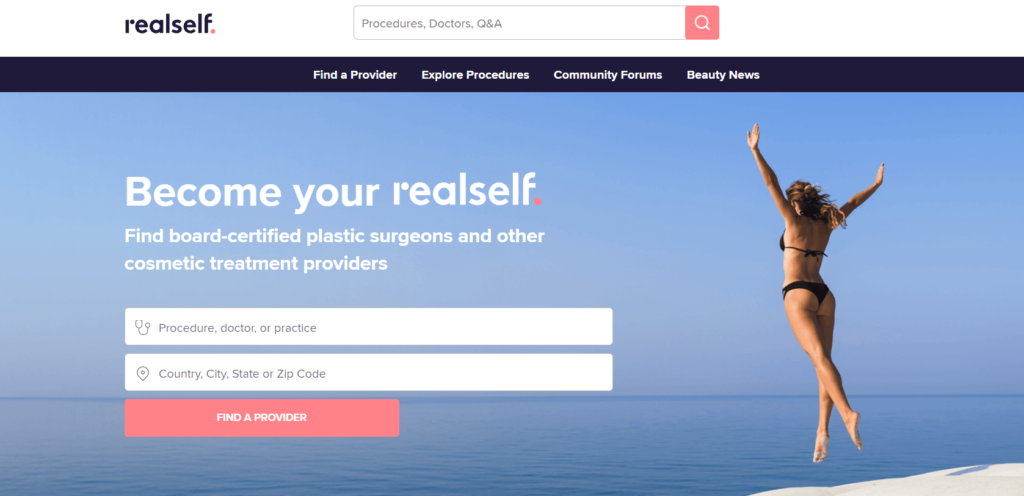
Optimize Your Directory Listings: Make sure your directory listings are fully optimized with accurate, up-to-date information about your practice. This includes your NAP, website URL, and a concise description of the services you offer.
Earn High-Quality Backlinks: Building backlinks from authoritative sources is another key aspect of off-page optimization. To do this, create valuable content—like blog posts, case studies, or infographics—that others in the plastic surgery field will want to link to. Reach out to influencers in your industry to share your content and link back to your site.
Engage in Online Communities: Participate in online forums and communities related to plastic surgery like ASPS forums. Share your knowledge and expertise, and provide value to others in these spaces. This not only helps build relationships but also increases the likelihood of earning valuable backlinks to your website.
By focusing on these three pillars—keyword research, on-page optimization, and off-page optimization—you’ll strengthen your local SEO strategy and position your plastic surgery center for long-term success.
3. Reviews and Reputation Management
In the world of plastic surgery, your reputation is everything. Potential patients are likely to research your you and your center online, reading reviews and checking your online presence before making a decision. That’s why managing your reviews and overall reputation is crucial to attracting and retaining patients.
In this section, we’ll dive into how you can gather positive reviews from satisfied patients and leverage online and offline features to boost your practice’s visibility and credibility.
Gather Reviews from Happy Patients
Good reviews and high ratings help you appear in local search results and attract new surgery patients.
Ask satisfied patients to leave reviews. Send a personalized follow-up email a few days after their surgery asking for feedback about the surgery and recovery.
If you get a negative review, don’t ignore it. Respond professionally and address the issue. This shows you care about your patients’ experiences and can lead to improved ratings.
Get Featured Online and Offline
Being featured on popular websites and directories boosts your visibility and builds backlinks, enhancing your SEO. So where do you begin?
Here are a few ideas to get the ball rolling:
Build Local Citations: List your center on directories like Yelp, Healthgrades, and Vitals. These sites often rank high for searches like “plastic surgeon [City name],” helping you get found more easily. Ensure your information is consistent across all listings to build trust with Google.
Online Press Mentions: Write guest blog posts for reputable sites or be featured as a source in articles. Use platforms like Connectively (HARO) to connect with journalists looking for expert quotes. This builds your backlink profile and improves your rankings.
Local Press Features: Share your insights on industry trends or new procedures with local news outlets and blogs. This can get you featured in articles or videos, boosting your local profile.
By following these steps, you can use local SEO to attract more qualified leads and grow your plastic surgery practice.
4. Traditional SEO Signals
Google, Bing, and Yahoo! use specific standards for ranking local listings.
Here’s a quick to-do list to “get started”
- To start off strong, focus on improving your website’s quality by speeding up its load times and organizing the site structure for both search engine bots and users. Make sure to post relevant content. Use tools like Screaming Frog to identify and fix technical SEO issues.
- Another key aspect is growing your backlink profile. You can do this by sending quotes on HARO, writing guest posts for well-known blogs, and maintaining consistent business citations across various directories.
- On-page SEO optimization is also crucial. Incorporate high-converting keywords into your page titles, H2s, blog content, and metadata, such as meta titles, descriptions, and tags.
- Additionally, investing in content marketing is important. Regularly publish relevant, optimized, and high-value posts on your blog.
By covering these areas, you show search engines that your site is helpful, which can lead to higher rankings.
Local SEO Tools and Resources for Plastic Surgeons
Google Business Profile: Manage your business presence on Google, including listings and local search results. Essential for any local online presence, it requires accurate information, photos, and reviews to boost visibility in local searches.
Google Analytics and Google Search Console: Free tools for tracking website visits, landing pages, clicks, goals, and conversions. Critical for understanding site performance, though there’s a learning curve.
Moz Local: An affordable tool for managing online listings and monitoring reputation. It helps track business listings, online reviews, and local search rankings, offering a budget-friendly alternative to Yext.
BrightLocal: Provides services like local keyword rank tracking, local citation building, reputation management, and audits. It’s used daily to optimize Google Business Profiles and websites.
Yelp: A review site where consumers find local businesses and leave reviews. By claiming and optimizing your listing with accurate info, photos, and reviews, you can enhance visibility in local searches.
RealSelf: A review site and community for cosmetic treatments, including plastic surgery. Claim your profile and engage with the community to build your online reputation and attract more qualified leads.
Ongoing Monitoring and Experimentation
Once you have implemented your local SEO strategy, it’s vital to monitor your results and experiment with different tactics. Try using new keywords to reach a broader audience or test various titles to see which ones get more clicks.
Experimentation is key to improving your website’s traffic and conversion rates.
If you notice any decline in traffic, identify and address the issues in your technical or on-page SEO. Google Analytics is a valuable tool for tracking site traffic and understanding high-traffic keywords, popular pages, and user behaviors that contribute to your site’s success.
Consistency is crucial. Without it, you risk losing your ranking and quality traffic.
If you’re worried you won’t have time to learn and do these things, you’re not alone. Plastic surgeons come to us because we remove the guesswork and ensure consistent growth for their plastic surgery center.
Interested in achieving the same results? Schedule a call with our local SEO expert today.